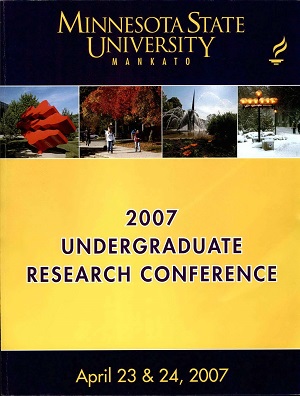Articulation in Conversation: A Comparison of Children with Williams Syndrome and Their Typically Developing Peers
Location
CSU 253/4/5
Start Date
24-4-2007 10:30 AM
End Date
24-4-2007 12:30 PM
Student's Major
Speech, Hearing, and Rehabilitation Services
Student's College
Allied Health and Nursing
Mentor's Name
Patricia Hargrove
Mentor's Department
Speech, Hearing, and Rehabilitation Services
Mentor's College
Allied Health and Nursing
Description
This project investigated articulation skills in spontaneous speech of individuals with Williams syndrome. Williams syndrome is a chromosomally based developmental disability. There are reports that articulation and phonological skills are surprisingly good in individuals with Williams syndrome. On the basis of these largely anecdotal reports, we predicted that individuals with Williams syndrome would be more articulate than their peers.
The purpose of this research was to compare the articulation skills of individuals with Williams syndrome to their typically developing peers. Ten participants, five with Williams syndrome and five typically developing peers, talked with a graduate clinician on a topic of their interest. The conversations were analyzed for percent consonants correct.
The results revealed individuals with Williams did not have significantly higher percentages of consonants correct than their typically developing peers. The finding will be discussed in light of the commonly held impressions about Williams syndrome.
Articulation in Conversation: A Comparison of Children with Williams Syndrome and Their Typically Developing Peers
CSU 253/4/5
This project investigated articulation skills in spontaneous speech of individuals with Williams syndrome. Williams syndrome is a chromosomally based developmental disability. There are reports that articulation and phonological skills are surprisingly good in individuals with Williams syndrome. On the basis of these largely anecdotal reports, we predicted that individuals with Williams syndrome would be more articulate than their peers.
The purpose of this research was to compare the articulation skills of individuals with Williams syndrome to their typically developing peers. Ten participants, five with Williams syndrome and five typically developing peers, talked with a graduate clinician on a topic of their interest. The conversations were analyzed for percent consonants correct.
The results revealed individuals with Williams did not have significantly higher percentages of consonants correct than their typically developing peers. The finding will be discussed in light of the commonly held impressions about Williams syndrome.
Recommended Citation
Weiss, Amy; Rachel Dahl; Jada Jokumsen; and Laura Johnson. "Articulation in Conversation: A Comparison of Children with Williams Syndrome and Their Typically Developing Peers." Undergraduate Research Symposium, Mankato, MN, April 24, 2007.
https://cornerstone.lib.mnsu.edu/urs/2007/poster-session-D/1




